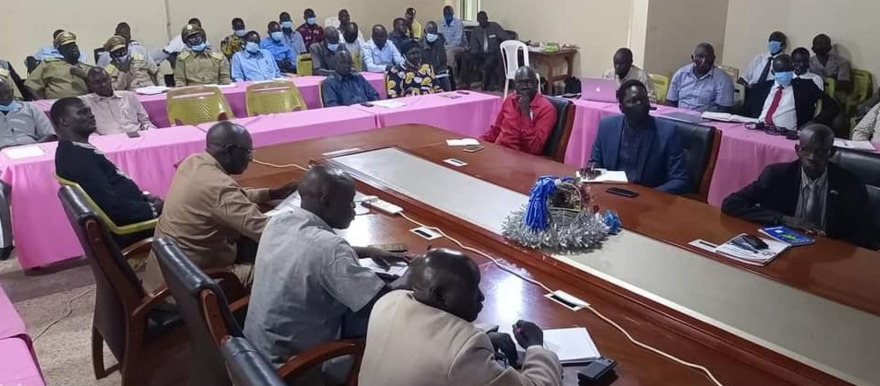A three days commissioner’s forum of Eastern Equatoria State concluded in Torit yesterday with calls for commissioners, mayors, and town clerks to cooperate with other local government administrators to deliver services to the population.
The forum also resolved that government should provide transport to counties, open roads, and communication networks to ease the work of commissioners.
The commissioner’s forum noted with great concern the failure of some officials to adhere to the Local Government Act and their usurping of the work of lower local government officials contrary to their Jurisdiction which hampers the county administrations in their carrying out their duties.
Marko Lokidor Locapio, the state’s peacebuilding minister and acting local government minister, also said the forum resolved to engage communities through dialogue to achieve lasting peace.
“We resolved on the recruitment, deployment of more administrative officers, professional law enforcement forces, and support staff to counties and municipalities,” Minster Lokidor said. “The provision of mobility for service delivery and building of police stations and outposts in identified locations to control crime. The security situation in the counties can be controlled.”
He added: “The last bullet here is that we need to open new feeder roads and rehabilitate the existing ones. Also, the provision of humanitarian assistance needs to returnees and IDPs, empowerment of community policing and equipping them with necessary security gadgets.”
The Kapoeta North County commissioner, Emmanuel Epone Lolimo, who represented his colleagues says the commissioners need to be supported in terms of financial resources despite the challenges the country is facing.
“Am grateful that during this three-day interaction, the presentation has been an eye-opener to the state ministries,” Commissioner Lolimo said. “I would like to appeal to the deputy governor and the acting minister of local government to kindly take into consideration the challenges facing the commissioners in delivering services to the people at the grassroots level.”
He added: “One of the challenges is the mobility of the commissioners and executive directors, it is a serious challenge which sometimes cripples our movement and gives room to a lot of issues in counties.”
Anthony Nwapa, the acting head of UNMISS’ field office in Torit urged the county and the state government to facilitate the movement of partner organizations to the grassroots level to generate information and address local concerns.
Deputy Governor Mary Alphonse Lodira recognized the commissioners for doing their best to restore security despite the challenges they face.
“I took note of what all of you are saying especially as the frontline staff, the commissioners, and the Payam administrators because they are there with the people seeing the needs of the people,” Deputy Governor Lodira said. “Some of the things you are asking for like communication equipment, computers, are pertinent in the twenty-first century.”
She added: “I truly understand without mobility and communication, we cannot blame the commissioners for not working. This to me is a serious problem. They are not paid well and this payment even comes after a long time. I think it is a mockery to our intelligence.”
The commissioners’ forum outlined challenges including insecurity due to poverty and hunger, consumption of illicit alcohol and guns in the wrong hands, lack of county courts for the effective administration of justice, unregulated movement of animals by herders, lack of professional law enforcement agencies, and organized forces, prolonged detention of suspects and delayed justice among others.
Other challenges highlighted included poor roads and poor telephone network penetration, inadequate transport in the counties, poor staff motivation and understaffing, inadequate service delivery, and humanitarian assistance response.




